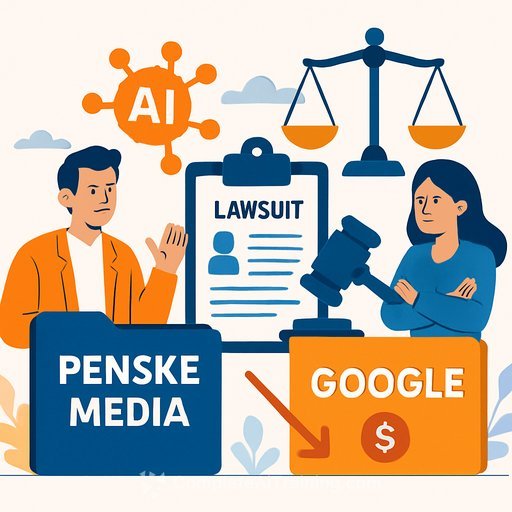Google sued by Penske Media over AI Overviews: what PR and communications leaders need to know
Google faces a new lawsuit from Penske Media Corporation (PMC) alleging the company illegally used publisher content to generate AI Overviews that siphon traffic and revenue. PMC owns Rolling Stone, Billboard, Variety, The Hollywood Reporter, Deadline, Vibe, and Artforum. Google denies wrongdoing and says AI Overviews help users and broaden discovery.
This is the first suit targeting Google over AI summaries in search, amid wider copyright challenges across the industry and regulatory pressure in Europe over AI Overviews.
The core allegations
- The "access for traffic" deal has changed: Google allegedly ties search indexing to supplying content for AI Overviews and model training.
- Opting out of these uses would mean dropping out of Google Search entirely, which PMC calls "devastating."
- PMC says clicks from Google declined after AI Overviews launched, affecting ads, subscriptions, and affiliate revenue.
- PMC argues Google is using its market power to coerce publishers into republishing content inside AI Overviews.
What Google says
Google says AI Overviews make search more helpful, send billions of clicks across the web, and increase the diversity of sites receiving traffic. The company calls the claims meritless and plans to defend against them. For context, see Google's post on AI Overviews and traffic.
Why this matters for PR and communications
PR teams depend on high-intent search visibility to convert earned media into measurable outcomes. If AI Overviews answer user questions without a click, coverage may reach fewer readers and produce weaker referral spikes.
There's also message integrity. AI-generated summaries can compress or reframe reporting, which may shift tone, bury brand context, or reduce attribution. That impacts reporting, stakeholder expectations, and how you design media plans.
Immediate steps for PR leaders
- Quantify impact: benchmark search referrals before/after AI Overviews for priority brands and stories. Track changes to CTR and session quality.
- Audit SERPs: for your top 50-100 queries, log when AI Overviews appear, which sources are cited, and how your brand is summarized.
- Strengthen signal quality: use clear headlines, plain-language answers, and strong subheads that mirror how people ask questions. Ensure accurate schema and structured data.
- Prioritize original assets: publish primary research, data visualizations, and exclusive statements. These are more likely to be cited and linked.
- Protect critical pages: coordinate with SEO/legal on meta directives (e.g., nosnippet), licensing terms, and AI training opt-outs where applicable. Balance protection with discoverability.
- Diversify distribution: build direct channels (newsletters, SMS, owned communities), deepen reporter relationships, and expand partnerships to reduce reliance on search.
- Revise dashboards: report on "SERP presence" and "citation in AI Overviews" alongside traditional referral metrics to set expectations with executives.
What to watch next
- Legal: developments on tying/monopoly claims and whether other publishers join or file similar suits.
- Product changes: adjustments to AI Overview frequency, attribution, and links that could swing traffic up or down.
- Regulatory pressure: European scrutiny over AI summarization and its impact on publisher economics.
Executive talking points
- Fair value exchange: publishers supply content; they need traffic and attribution in return.
- Measurement: AI Overviews may compress referral volume; we're adapting plans and KPIs accordingly.
- User need vs. publisher sustainability: helpful summaries should still route readers to quality reporting.
- Our response: strengthen original content, improve technical markup, and diversify channels to protect outcomes.
Statement from PMC CEO Jay Penske: "As a leading global publisher, we have a duty to protect PMC's best-in-class journalists and award-winning journalism as a source of truth… and preserve its integrity - all of which is threatened by Google's current actions."
Upskill your team on AI and search shifts
If your remit includes media strategy, measurement, or content operations, consider focused training on AI-driven search and content workflows: Courses by Job.
Your membership also unlocks:






